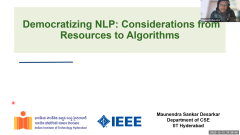Fun and Games with Artificial Intelligence: David B. Fogel
The real potential of artificial intelligence comes in having machines learn to solve problems without being told how to solve them. Researchers have been exploring the potential for machine learning for many decades, and much of that research comes in the area of games. In this public lecture, David Fogel provides a little history on some of the earliest efforts to get machines to solve problems on their own, and then describes some fun experiments he led to get computers to learn to play checkers and chess. He also shows some animations of characters in video games that learn to improve their behavior over time.
Dr. David Fogel is President of Natural Selection, Inc., an internationally recognized award-winning company with a 23-year history of solving challenging engineering problems. Dr. Fogel is a Fellow of the IEEE, the world’s largest organization of professional engineers. He received the Ph.D. in engineering from UC San Diego and has an honorary doctorate from the University of Pretoria, South Africa. Dr. Fogel has published 7 books and over 200 publications in technical journals, conferences, and other venues. He’s a recipient of several awards, including an IEEE Technical Field Award and the CajAstur Prize for Soft Computing. Dr. Fogel is also co-inventor EffectCheck®, a sentiment analysis system that relies on a 50,000-word emotional thesaurus and hold 12 patents.
The real potential of artificial intelligence comes in having machines learn to solve problems without being told how to solve them. Researchers have been exploring the potential for machine learning for many decades, and much of that research comes in the area of games. In this public lecture, David Fogel provides a little history on some of the earliest efforts to get machines to solve problems on their own, and then describes some fun experiments he led to get computers to learn to play checkers and chess. He also shows some animations of characters in video games that learn to improve their behavior over time.
 Cart
Cart Create Account
Create Account Sign In
Sign In






